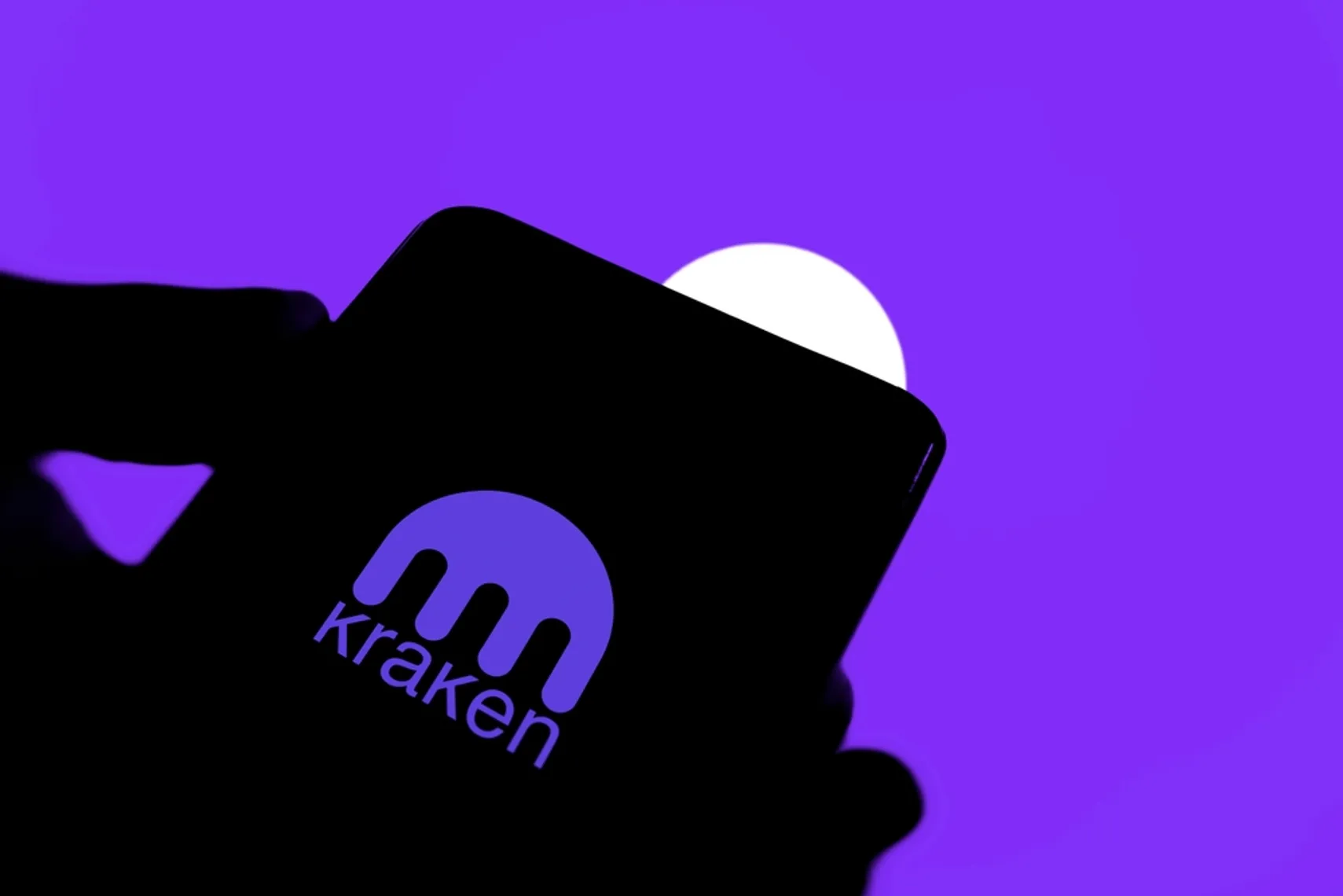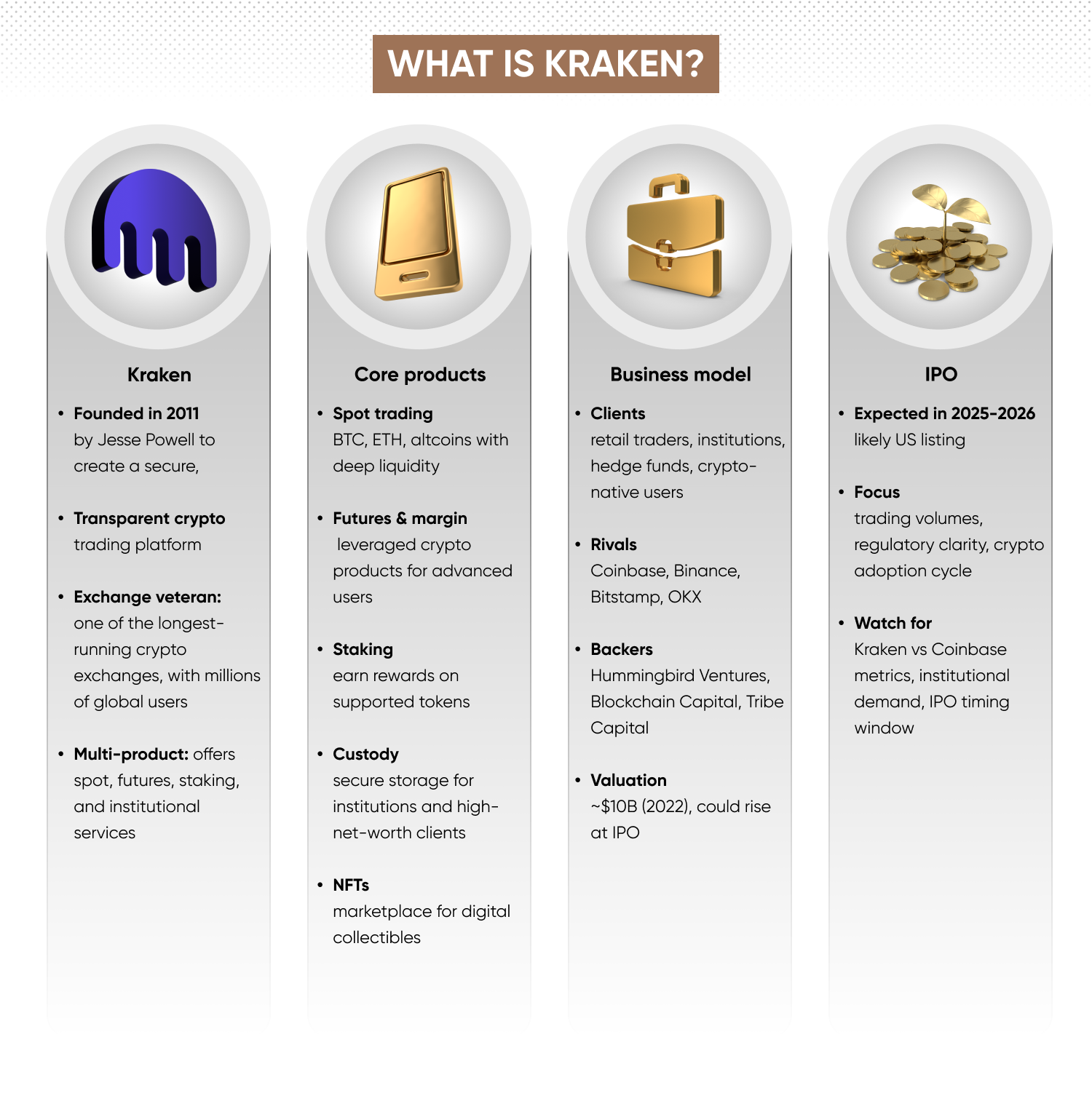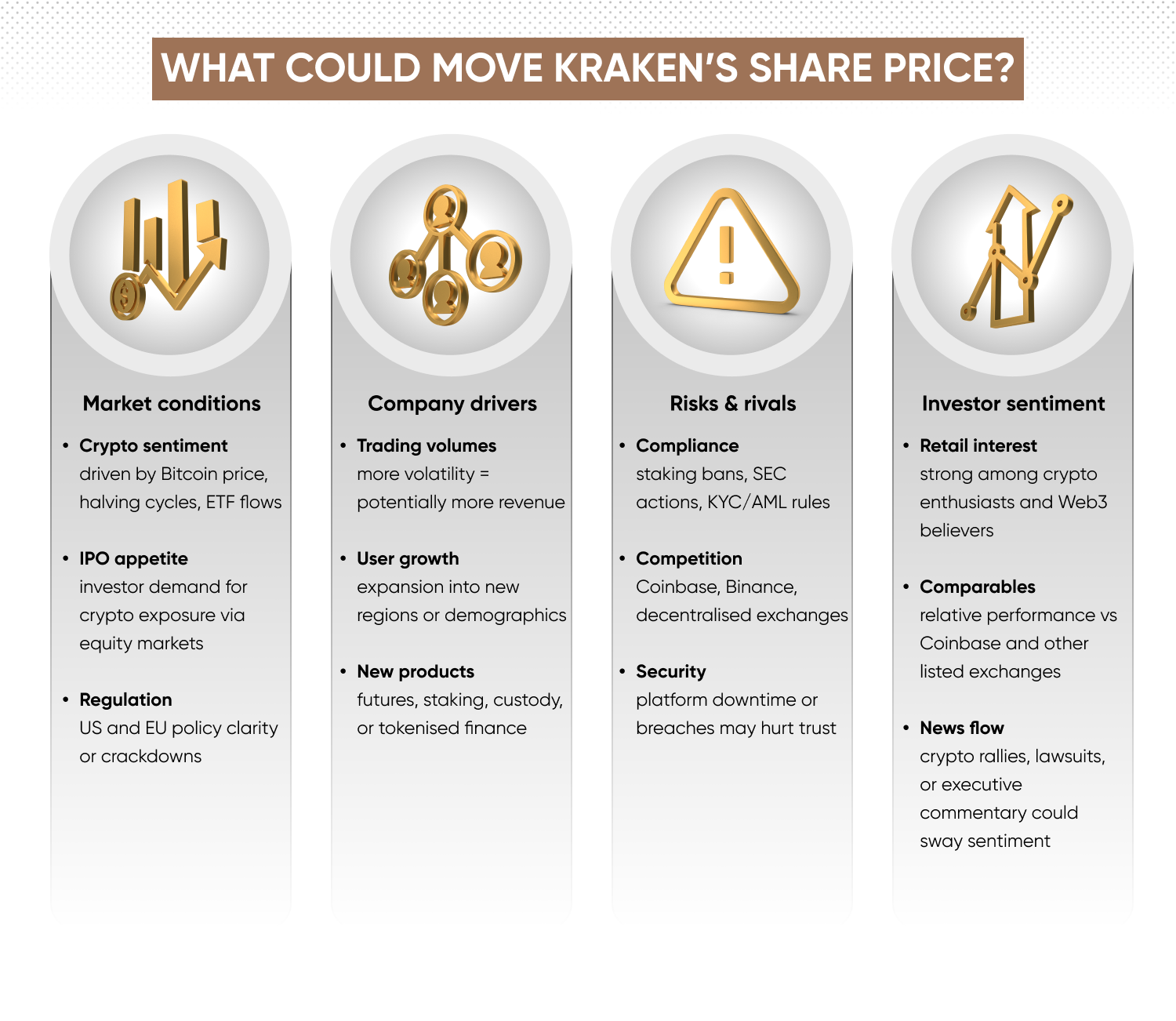Kraken IPO- how to trade Kraken shares

Learn about Kraken and its anticipated IPO, including key business drivers, potential valuation, and how to trade its stock via CFDs when it lists.
When is the Kraken IPO date?
As of April 2025, Kraken has not confirmed an initial public offering (IPO) date, but reports suggest a listing could occur as early as late 2025 or 2026. The company has long been viewed as a top IPO candidate in the crypto sector, especially following Coinbase’s public debut in 2021.
Factors that could affect the timing include:
-
Market conditions: crypto IPO appetite is highly sensitive to bitcoin price trends, regulatory sentiment, and equity market risk-on/risk-off cycles.
-
Regulatory clarity: Kraken’s decision may depend on the outcome of several high-profile regulatory cases in the US and Europe.
- Business performance: a surge in trading volumes or product diversification could support a more favourable valuation ahead of a listing.
What is Kraken?
Kraken is a US-based cryptocurrency exchange founded in 2011 by Jesse Powell. It enables users to buy, sell, and stake a wide range of digital assets including bitcoin, Ethereum, and altcoins. Kraken is known for its security focus and deep liquidity, and it’s one of the longest-operating exchanges in the industry.
As of 2025, Kraken serves over 9m clients across more than 190 countries, with average daily trading volumes ranging between $500m and $1bn depending on market conditions. The company employs approximately 2,300 people globally and offers support for more than 200 cryptocurrencies and tokens. Its platform caters to both retail and institutional traders, with products spanning spot and margin trading, futures, staking, and custodial services.
Key milestones
-
2011 – Kraken founded in San Francisco
-
2013 – becomes one of the first exchanges to pass a cryptographically verifiable audit
-
2020 – earns a US banking charter as a Special Purpose Depository Institution in Wyoming
-
2022 – launches Kraken NFT marketplace and expands staking services
- 2024 – surpasses 10 million users globally amid rising institutional adoption

How does Kraken make money?
Kraken makes money by offering a wide range of crypto trading and financial services to both retail and institutional clients. While most of its income comes from transaction fees, the platform has steadily expanded into staking, futures, and custodial services, broadening its revenue base as the crypto market matures. Its earnings are closely tied to trading volumes and asset prices, meaning market cycles can have a significant impact on profitability.
Here’s more on the company’s revenue streams.
|
Revenue stream |
Description |
|
Trading fees |
Commissions charged on crypto buy/sell orders placed by retail and institutional clients. |
|
Staking and rewards |
Earns a cut of staking rewards distributed to users who stake their tokens via Kraken. |
|
Margin trading and futures |
Fees from leveraged products and perpetual contracts on supported crypto pairs. |
|
Custody and OTC services |
Income from secure asset storage and high-volume over-the-counter trading. |
|
Institutional tools |
Revenue from Kraken Pro and bespoke solutions for hedge funds, family offices, and corporates. |
Kraken uses a tiered fee structure, with lower costs for high-volume traders. It applies a maker-taker model that encourages liquidity by charging lower fees to market makers. This approach appeals to institutional clients and helps sustain deep order books on the platform.
Kraken is also notable for becoming the first crypto firm to receive a banking charter in the US, via Wyoming’s SPDI framework. This allows it to operate more like a traditional bank, offering custodial and settlement services without fractional reserve lending. If successfully rolled out, Kraken Bank could serve as a bridge between crypto and traditional finance – offering crypto-native accounts, payments, and potentially even debit or credit products.
What might influence the Kraken live stock price?
Once Kraken goes public, its stock price will likely reflect both the volatile nature of the crypto market and the company’s position within it. As one of the most established exchanges globally, Kraken’s valuation could be shaped by user growth, trading activity, regulatory developments, and product innovation.
But with high exposure to crypto cycles and policy uncertainty, the share price could also face sharp swings – especially in the early stages of trading.
Crypto market momentum
Kraken’s fortunes are tightly linked to overall crypto market sentiment. If bitcoin and Ethereum enter a bullish cycle, Kraken could see higher trading volumes, increased revenue, and investor enthusiasm for its stock. A surge in altcoin interest or new crypto narratives (like AI tokens or layer 2 rollouts) could also drive user activity on the platform.
On the flip side, if the crypto market enters a prolonged downturn, volumes may drop and investor confidence in Kraken’s growth outlook could weaken, dragging on the share price.
Regulatory clarity vs crackdown
Regulatory developments could act as either a major tailwind or headwind for Kraken. A clear, supportive framework from US or European regulators could validate Kraken’s business model and open up new revenue streams, such as staking, custody, or tokenised securities.
However, if lawmakers impose stricter rules or crack down on centralised exchanges, particularly around staking or classification of assets as securities, Kraken’s core services could be disrupted – and its share price may react accordingly.
Trading volumes and user growth
If Kraken reports strong growth in active users and transaction volumes, particularly during market rallies or product launches, its stock could gain traction. Expansion into new regions or partnerships with institutional players would likely be seen as value drivers.
In contrast, declining user engagement, stagnating volumes, or a fall in market share versus rivals like Coinbase or Binance could lead to bearish sentiment from analysts and investors.
Diversification and innovation
Investors may reward Kraken if it successfully expands beyond spot trading. New product launches such as futures, options, NFT markets, or crypto-linked debit cards could create fresh revenue streams and boost sentiment. Kraken’s push into banking services, through its Wyoming SPDI charter, may also attract bullish coverage.
But if these initiatives fail to gain traction, or if operational issues emerge in new segments, the share price could come under pressure.
Public listing performance and IPO hype
Like many tech-driven IPOs, Kraken’s early share price performance could be influenced by market sentiment and IPO mechanics. Strong demand during the bookbuild phase and a successful first trading day may lead to momentum-driven gains. However, if the IPO is priced too aggressively, or if early investors sell off quickly, Kraken’s stock could experience high volatility or post-IPO declines, particularly in a risk-off environment for growth stocks.

How to trade Kraken stocks via CFDs
If Kraken lists publicly, you may be able to trade its shares as CFDs. Here’s how:
- Choose a platformCapital.com offers CFD trading on thousands of global stocks, including new IPOs and crypto-related companies.
- Open an accountRegister, verify your identity, and choose your trading preferences.
- Fund your accountDeposit funds into your account. Only trade with capital you can afford to risk.
- Track the IPOMonitor Kraken IPO news, regulatory updates, and price movements once the stock lists.
- Trade the stockUse long or short positions to speculate on price. Add stop-losses and take-profits to manage risk.
Learn more in our CFD trading guide.
Which crypto and fintech stocks can I trade?
While Kraken is still private, there are several listed companies with exposure to crypto exchanges, fintech platforms, and blockchain infrastructure:
-
Coinbase (COIN) – the largest US-based exchange and closest public comparable to Kraken
-
Robinhood (HOOD) – trading app with crypto functionality and a large retail base
-
Block (SQ) – formerly Square, integrates Bitcoin into payments and offers crypto services
-
Riot Platforms (RIOT) – Bitcoin mining company that rises with crypto prices
-
Marathon Digital (MARA) – one of the largest Bitcoin mining firms in North America
-
MicroStrategy (MSTR) – holds large amounts of Bitcoin as part of its corporate treasury
See our full shares trading guide to explore more opportunities.
FAQ
Who owns Kraken?
Kraken is a privately held company, founded by Jesse Powell in 2011. Powell remains a key shareholder and figurehead in the crypto space, though the company is now led by CEO David Ripley. Kraken has raised funding from a range of investors over the years, including Hummingbird Ventures, Blockchain Capital, Digital Currency Group, and Tribe Capital. These early backers may hold sizable stakes heading into the IPO, depending on how the offering is structured.
How much is Kraken worth?
Kraken was valued at around $10bn in its last known funding round, but that figure could rise or fall depending on crypto market conditions and investor appetite at the time of IPO. Valuation will likely be benchmarked against Coinbase, Kraken’s publicly listed rival, with adjustments made for differences in market share, product scope, and geographic exposure.
When will Kraken IPO?
There’s no confirmed IPO date yet, but industry insiders expect Kraken to go public in 2025 or 2026. The timing could depend on a combination of strong crypto market conditions, increased regulatory clarity, and the performance of other publicly listed exchanges. The company has previously expressed interest in becoming a public entity when the time and environment are right.
Can I invest in Kraken before the IPO?
Investing in Kraken before the IPO is typically limited to institutional or accredited investors via private rounds or secondary market transactions. Some platforms may offer access to pre-IPO shares, but these tend to involve higher risks, limited liquidity, and eligibility restrictions. Most retail investors will need to wait until the IPO to gain exposure.
Will Kraken be available for CFD trading?
If Kraken lists on a public exchange, brokers like Capital.com may offer its stock as a CFD (contract for difference). This allows traders to speculate on Kraken’s share price movements without owning the underlying stock, and to trade using leverage or take long and short positions. Availability will depend on market demand and post-listing liquidity. And remember: leverage can amplify both your profits and losses.
Discover more upcoming IPOs
Stay informed on upcoming IPOs, market trends, and the newest trading opportunities

SpaceX IPO
